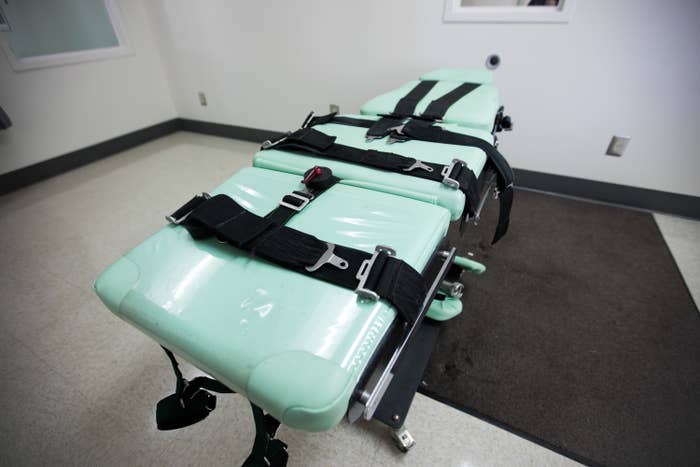“The Squad” Is Raising Money To Fight For Progressive Candidates
The Squad Victory Fund will allow Reps. Alexandria Ocasio-Cortez, Ilhan Omar, Ayanna Pressley, and Rashida Tlaib to help raise money for their campaigns and other progressives.
Kadia Goba BuzzFeed News Reporter
Reporting From Washington, DC Posted on July 1, 2020

Alex Wroblewski / Getty Images
Reps. Alexandria Ocasio-Cortez, Ayanna Pressley, Ilhan Omar, and Rashida Tlaib.
WASHINGTON — Members of the Squad are launching a fundraising committee to raise money for their reelections and progressive campaigns all over the country.
Reps. Alexandria Ocasio-Cortez, Ilhan Omar, Ayanna Pressley, and Rashida Tlaib are combining their star power as outspoken first-term members of Congress to support other progressive hopefuls. The group will announce Wednesday accompanied by a short video.
As a joint fundraising committee, the Squad Victory Fund can only donate to political action committees already associated with each member’s individual campaign. Those PACs can then donate to other progressives.
At least half of the money will go to the congress members' individual campaigns to fend off opponents backed by high-spending.supporters. The Washington Post reported a slew of fundraising from the financial industry poured into Michelle Caruso-Cabrera's campaign who ran an unsuccessful primary against Ocasio-Cortez earlier this year.
The Squad has also received ire from President Donald Trump during campaign rallies and on Twitter.
Ocasio-Cortez and Omar are among the 30 strongest fundraisers in Congress; Ocasio-Cortez is the fifth-highest and has raised $2 million more this cycle than House Speaker Nancy Pelosi, another prolific fundraiser. In line with their grassroots approach to fundraising, they’ll reject money from lobbyists, corporate PACs, fossil fuel companies, and — a decision arrived on the heels of George Floyd’s killing — police organizations. (Not that much would likely be coming their way from such interests, as the four Democrats push to defund the police.)
“The progressive policies that my sisters and I are fighting for — Medicare for All, a Green New Deal, racial justice, an end to mass incarceration — have never been more important,” Ocasio-Cortez told BuzzFeed News.
Omar noted the “unprecedented historical moment” facing the nation. “People in our districts and across the country are demanding solutions to crises of public health, economic, and racial justice,” she said.
The Squad’s fundraising effort comes after several long-standing congressional members have already faced tough progressive challengers during 2020 primaries and lost. Jamaal Bowman who has likely unseated House Foreign Affairs Committee Chair Eliot Engel. (An overwhelming number of mail-in votes due to the coronavirus will significantly delay a final tally, but Bowman leads significantly with more than 50,000 votes counted.)
“Last week’s elections showed the strength of progressive candidates of color who can speak to their communities,” Omar told BuzzFeed News, referencing Bowman’s likely win. “But they also showed the length the establishment is willing to go to cling to power.”
All four members backed progressives in the presidential primaries; all but Pressley — who backed Sen. Elizabeth Warren — endorsed Sen. Bernie Sanders.
But the fervor to oust moderate Democrats in Congress — and moderate Democrats’ continued worries about being primaried — began this cycle in September 2019 when Ocasio-Cortez backed Marie Newman, a progressive, who ultimately ran a successful campaign against Illinois Rep. Dan Lipinski, one of the last anti-abortion Democrats in Congress.
The Squad’s progressive movement is rooted in Ocasio-Cortez’s 2018 unexpected win against Rep. Joe Crowley, a longtime incumbent and favorite to succeed Speaker Nancy Pelosi in leadership. Omar, Pressley, and Tlaib were elected at the same time and quickly became a noticeable force within the House Democratic caucus.
But even with the backing of progressive political PACs, the progressive wing of the Democratic caucus has struggled with gaining support for policies like the Green New Deal and Medicare for All. The lawmakers are helping to level the playing field.
“Wall Street and Trump donors poured over $3 million into an attempt to defeat me and now they’re preparing to do even more to stop this progressive momentum in its tracks,” Ocasio-Cortez said. “The Squad Victory Fund will help us fight back.”
UPDATE
July 1, 2020, at 8:23 a.m.
This story was updated to include more information about the Squad Victory Fund.
A Black Progressive Beat A 16-Term Democrat In A Heated New York Congressional Primary
Addy Baird · June 24, 2020
The Progressive Caucus Doesn’t Want To Just Be A Social Club Anymore
The Progressive Caucus Doesn’t Want To Just Be A Social Club Anymore
Addy Baird · Dec. 27, 2019
A Progressive Challenger Has Beaten One Of The Last Anti-Abortion Democrats In Congress
A Progressive Challenger Has Beaten One Of The Last Anti-Abortion Democrats In Congress
Addy Baird · March 17, 2020

Kadia Goba is a political reporter for BuzzFeed News and is based in Washington, DC.

Kadia Goba is a political reporter for BuzzFeed News and is based in Washington, DC.








